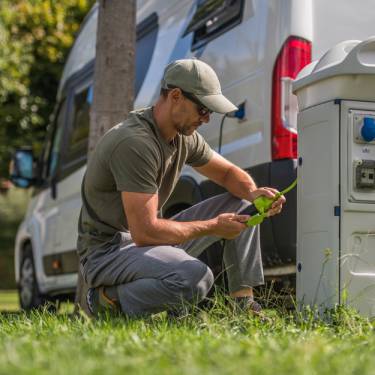
Outfitting an RV means making plenty of choices, and one of the biggest decisions is how to power it. Is electric power better than propane for your RV? Both options have perks, but the right choice depends on your camping habits and priorities. Let’s break it down.
The Basics of Propane Power
Propane has been a popular RV power choice for decades because it’s compact and easy to find. Since it doesn’t need to be plugged in, propane is great for remote adventures and boondocking. It can be used to heat water, cook, power fridges, and stay warm.
Propane also has its downsides, though. Refilling tanks can be inconvenient, especially on long trips, and propane requires careful monitoring to avoid running out of fuel. If sustainability is your goal, it’s worth noting that propane appliances are less efficient than electric and emit pollutants during combustion.
The Rise of Electric Power in RVs
Electric power is becoming a strong contender in RV setups, especially with solar panel technology and accessibility to shore power at campgrounds. Electric RVs use batteries, making them a cleaner option compared to propane.
Induction cooktops, electric water heaters, and fridges work seamlessly with solar-charged batteries or campsite hookups. Using electric appliances supports sustainability by cutting fossil fuel reliance, making them ideal for eco-friendly travelers.
However, there are challenges here too. Fully electric setups can be expensive upfront due to equipment like solar panels and inverters. They also depend on sunny weather or frequent access to power sources, which might not suit travelers venturing off-grid for extended periods.
Comparing Propane and Electric
To figure out which option is better for your RV, consider which factors matter most to you:
- Cost: Propane systems are cheaper upfront, while electric systems need a higher initial investment for batteries and solar. However, electric power can save money in the long run with free solar energy.
- Convenience: Propane is portable and widely available, making it ideal for boondocking. Electric setups work well in campgrounds with hookups but can struggle without steady power.
- Sustainability: If reducing emissions matters more to you, electric power is the clear winner, given its compatibility with renewable energy sources.
- Safety: Electric systems eliminate risks like propane leaks but require battery maintenance to prevent overloads.
Both systems work well together. Using propane as a backup for heating or cooking while relying mainly on electricity can provide flexibility. This is evident during winter trips, when incorporating thermal curtains into your RV camper becomes relevant for keeping warmth where it’s needed most.
Which Option Fits Your RV Lifestyle?
Ultimately, whether electric power is better than propane for RVing depends on how and where you plan to explore. Finding a balance between the two systems might be the most practical solution for many RVers.
Bio: Casey is a passionate copyeditor highly motivated to provide compelling SEO content in the digital marketing space. Her expertise includes a vast range of industries from highly technical, consumer, and lifestyle-based, with an emphasis on attention to detail and readability.




















